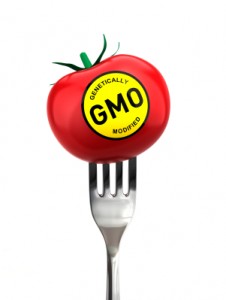|
Listen To The Article
|
 Like modern-day Dr. Frankensteins, food scientists in the employ of agribusiness have unlocked the secrets of life, and they are using their knowledge to create brand new species of plants and animals that have never existed before anywhere on earth. Genetic engineering techniques that allow splices of DNA from one organism to be inserted into the DNA of another have allowed these well-funded mad scientists to synthesize some of the most unlikely chimeras imaginable. For the giant agribusiness interests, these new plant and animal hybrids have proven to be a goldmine, and up to 80% of all the processed foods now sold and consumed in the United States include genetically-modified organisms (GMOs) in their list of ingredients.
Like modern-day Dr. Frankensteins, food scientists in the employ of agribusiness have unlocked the secrets of life, and they are using their knowledge to create brand new species of plants and animals that have never existed before anywhere on earth. Genetic engineering techniques that allow splices of DNA from one organism to be inserted into the DNA of another have allowed these well-funded mad scientists to synthesize some of the most unlikely chimeras imaginable. For the giant agribusiness interests, these new plant and animal hybrids have proven to be a goldmine, and up to 80% of all the processed foods now sold and consumed in the United States include genetically-modified organisms (GMOs) in their list of ingredients.
But you would never know any of this by reading the labels on the foods you buy in the supermarket. While the Food and Drug Administration requires food producers to list ingredients, calorie counts, weights and serving sizes, and nutritional information, there are no rules that force food companies to reveal when the products they are selling contain GMOs.
Fresh Heirloom Seeds without FDA and GMO Labeling…
What You Eat is None of Your Business
Several polls have been taken to gage the public’s attitude about genetically-altered food products, and these opinion surveys have shown overwhelming support for mandatory labeling of all food products that contain GMOs. And yet, while more than 90% of all Americans favor full GMO disclosure, the FDA has resisted all pleas to require producers to furnish this information on its food labels. The FDA’s rationale is that there is no material difference between genetically-modified crops and animals and similar species that have not been altered, and therefore there is no reason to force companies to reveal when they are including GMOs in their products.
Not everyone is so copasetic about genetically-altered organisms, however. GMO crops and the products that use them have been extensively tested in independent laboratories all over the world, and many researchers have found troubling connections between GMO consumption and various types of health problems, including:
- Infertility
- Digestive problems
- Organ damage
- Immune system disorders
- Birth defects
- Severe allergic reactions
Not surprisingly, the agribusiness companies producing and selling genetically-altered plants, animals, and seeds, as well as the food companies that sell processed foods that contain them, claim their studies have found no deleterious health effects connected to the consumption of GMOs. And just as unsurprisingly, the FDA agrees with this assessment, choosing to ignore all the studies that have contradicted the self-interested assurances of big agriculture and the food industry.
One factor working in favor of big agriculture is the fact that GMOs have not been in the food supply long enough for their full effects on human health to be accurately assessed. Outside of the laboratory, it can take many years to establish a clear and unambiguous connection between certain kinds of foods and specific health problems, and this fact makes it easy for agribusiness companies to cast doubts and aspersions on any studies they produce inconvenient results.
Of course, these uncertainties about the long-term health implications of GMO consumption provide a powerful rationale to support mandatory labeling. At the very least, consumers should be informed if GMOs are being used in the things they are eating, so they can decide for themselves whether or not they want to consume foods that contain genetically-altered ingredients. However, at this stage the FDA appears much more concerned about protecting the companies they are supposedly regulating from the consequences of labeling than they are with protecting American consumers from something that might be bad for them. When there are concerns about the safety of new foods that have never been grown anywhere on the surface of the earth before, you would expect the FDA to err on the side of caution. But instead, they are acting as if we are all in a court of law, where we must assume GMOs are innocent until proven guilty beyond a reasonable doubt.
Even if, for the moment, we accepted the FDA’s backward reasoning and agreed that GMOs should be allowed into the food supply until proven unsafe, it is hard to understand the resistance to labeling. Since this would not restrict or prohibit companies that wanted to sell GMO products from doing so, there would seem to be no reason why the FDA would make an exception to its normal labeling requirements in this instance. But this is only confusing if you actually believe that the FDA’s primary raison d’etre is to protect the American people from dangerous foods and drugs.
A closer look at the statistics reveal the truth about what is really going on – the public opinion surveys mentioned earlier found that more than 50% of all Americans have their doubts about the safety of GMOs, and 57% say they would be less likely to purchase food products that contained genetically-engineered ingredients if labeling were required. This, of course, is the real reason why agribusiness companies are so adamantly opposed to labeling, because they know it would cost them money and market share. But the idea that the FDA, a taxpayer-funded organization, would deny the public its right to know what is in the food it is consuming simply because it might adversely affect the bottom line of certain private businesses is appalling. The unholy alliance that has been formed between big agriculture and the federal government has resulted in the American public being used as guinea pigs in a gigantic and ongoing science experiment involving its food supply, and we have no idea what kind of health problems we may all be facing down the line thanks to the FDA’s reluctance to do the job it allegedly exists to do.
Confronting the Two-Headed Beast
In response to public demand, forty other countries already require labeling of genetically-altered crops, animals, and processed food products containing GMOs. The fact that it hasn’t happened here despite the wishes of the people reveals a lot about how far we have drifted away from the true principles of representative democracy. Government of the people, by the people, and for the people has given way to government of the corporations, by the corporations, and for the corporations, and in the current environment the US Food and Drug Administration operates as little more than a quasi-scientific front for both agribusiness and the big pharmaceutical companies.
And in case anyone is wondering about states perhaps requiring labeling on their own, with or without the support of the federal government, what is happening in Vermont is highly instructive. The legislature there was all set to pass a law requiring labeling until one the world’s largest purveyor of genetically-engineered seeds threatened to sue the entire state if they did so. As soon as Big Ag got involved, Vermont’s legislators immediately went into a stalling pattern, and it is only a matter of time until this once-promising bill is allowed to fade into oblivion. Even at the state level, the influence of big agriculture is so strong that it can stop the democratic process in its tracks by simply clapping its hands together and telling elected officials to roll over and play dead.
A group called “Just Label It” has now collected over one million signatures on a petition demanding that the FDA finally require all food companies to label the products on our grocery store shelves that contain genetically-engineered ingredients. If democracy functioned the way it was supposed to, the FDA would respond to this petition, which they received in October of 2011, by bowing to the will of the people and changing their minds on this issue. But the FDA is scheduled to respond to the “Just Label It” initiative very soon, and when it announces that it has rejected the petition and that food producers will be allowed to continue selling GMO products in secret and with impunity, absolutely no one anywhere should be the least bit surprised.
 Off The Grid News Better Ideas For Off The Grid Living
Off The Grid News Better Ideas For Off The Grid Living




